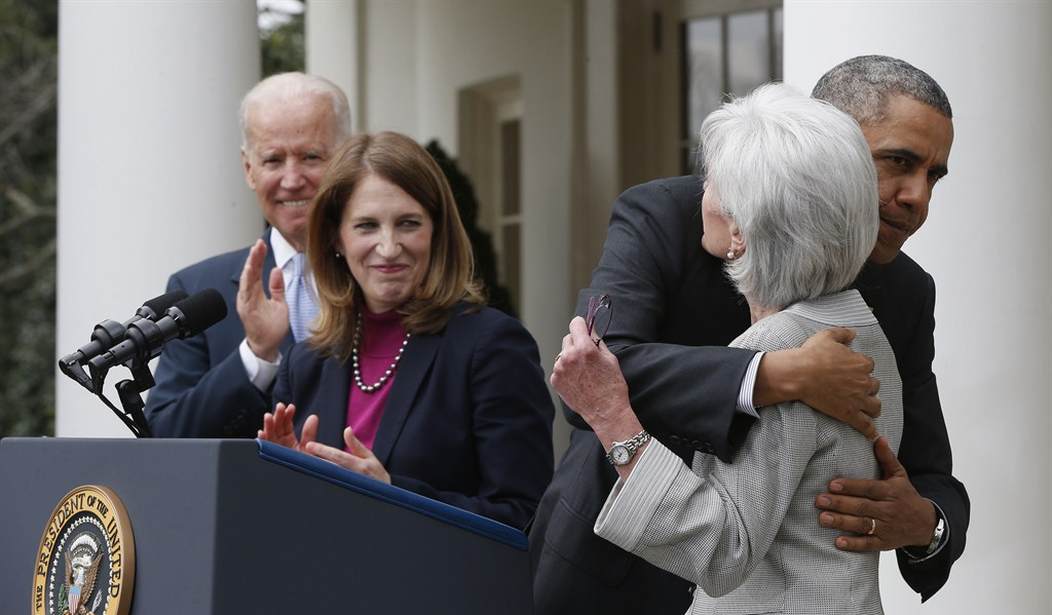The law. It's working, you guys. It's working so well that one entire year into its full implementation, insurers feel compelled to extend yet another alleged deadline because the so-called 'back end' of the program's website is still a hot mess. That big "re-branding" campaign can't come soon enough, in order to allow supporters to keep on highlighting Obamacare's unparalleled success:
Trying to head off a new round of consumer headaches with President Barack Obama's health care law, the insurance industry said Tuesday it will give customers more time to pay their premiums for January. America's Health Insurance Plans, the main industry trade group, says the voluntary steps include a commitment to promptly refund any overpayments by consumers who switched plans and may have gotten double-billed by mistake. Though the HealthCare.gov website is working far better this year, the industry announcement highlights behind-the-scenes technical issues between the government and insurers that have proven difficult to resolve. Last year's enrollment files were riddled with errors, and fixing those has been a painstaking process. As a result, renewing millions of current customers is not as easy as it might seem.
Renewals and logistics:
Renewing coverage each year is standard operating procedure for the industry, but 2015 is the first renewal year for the health law. The process involves a massive electronic data transfer from the government to insurers, happening right around the holidays. Insurers then have to use that data to generate new cards for their customers. Normally, premiums for January would be due by Dec. 31. The industry's grace period for 2015 could vary among different carriers, so consumers should check with their plan...Making matters more confusing, open enrollment actually runs for another two months, until Feb. 15. People enrolling by that date will get coverage starting March 1. Current customers can still make plan changes through Feb. 15. Based on early numbers, it's looking like the majority of the roughly 6.7 million current customers have opted to stay with the plans they have now and be automatically renewed Jan. 1.
Recommended
The good news about automatic renewals from the administration's perspective is that the process puts a lot of coverage on autopilot. At least in theory. The problem for them is that with Healthcare.gov's back end still under construction, the 'autopilot' reconciliation machinery still isn't working properly. Those bugs and flaws have resulted in improper subsidy payments for an untold number of consumers, which could lead to a nightmarish tax season for those victims of federal incompetence. Another problem that will impact even more Americans results from "benchmark" plans changing in 2015, meaning that auto-re-enrollment will, in many cases, result in unexpected rate increases for unsuspecting customers. Most new consumers selected these "baseline" plans last year, based on cost considerations -- but many of the most popular 2014 plans will experience double-digit premium increases in the new year, and are being supplanted by fresh, less-expensive 2015 baseline plans. People who simply stick with their existing plan to avoid hassle will get slapped with higher bills; avoiding that unpleasantness requires switching plans again, which comes will all of the access/network headaches that have dogged many Obamacare customers. Meanwhile, even as many Americans are experiencing higher premiums and out-of-pocket costs, some average rate increases aren't as steep as critics predicted. That will change next year, argues economist Stephen Parente:
Americans visiting Healthcare.gov to purchase 2015 health-insurance plans are finding a nice surprise: Average premiums for the cheap “bronze” plans have increased only by 3.4% and premiums for the middle-of-the-road “silver” plans are rising by 5.8%, according to the American Action Forum. Where are the double-digit premium increases that so many predicted? Check back around this time in 2016. That’s when you’ll see the real spikes. The Affordable Care Act includes two temporary programs that make compliant health-care plans temporarily appear far cheaper than they are: Risk corridors and reinsurance. Both programs will expire on Jan. 1, 2017. By November 2016, consumers will know how that sunset will affect their plan’s premium. Risk corridors and reinsurance are simple concepts: They subsidize insurance companies with taxpayer money. With the former, the taxpayer is covering the difference when patients spend more on health care than insurance companies predicted...The taxpayer’s generosity allows insurance companies to hide the true costs of the plans. But this will likely end when both programs expire in two years. At the same time, the exemptions issued by the White House and the Department of Health and Human Services—including the exemptions that allowed millions of consumers to keep noncompliant plans that would have been canceled—will also expire on New Year’s Day, 2017.
Millions of Americans are already feeling stymied by Obamacare's
As Obamacare architect Jonathan Gruber has admitted, Obamacare's "cost containment" promises were all about telling people "what they want to hear." In reality, he explained, the law is an expensive wealth redistribution scheme, which "would not have passed" if advertised honestly.

























Join the conversation as a VIP Member